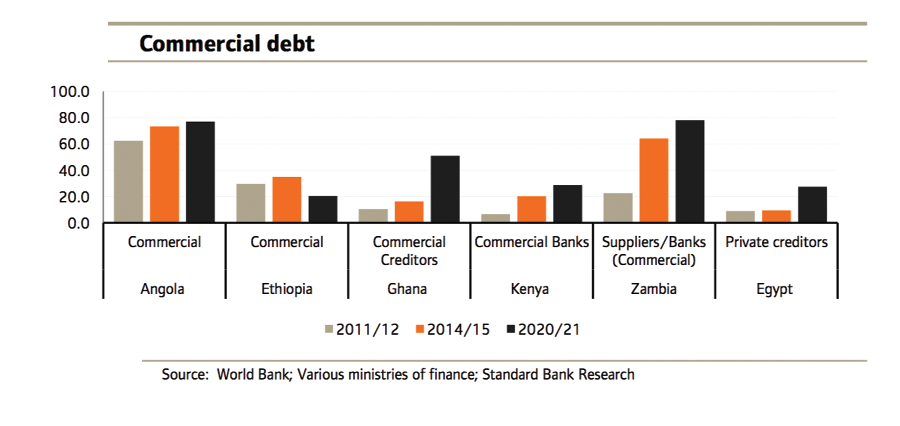Despite the possibility of the country reaching an agreement with the International Monetary Fund (IMF) by April, 2023, it will still be difficult to source external commercial funding from the Eurobond market in the first half of 2023, a new Standard Bank report has indicated.
The report explained that this was due to the fact that the country, just like many other African economies, is still recovering from the COVID-19 pandemic and now, also, fighting inflation triggered by supply-chain shortages caused by the war in Ukraine.
This is likely to pose more problems for the economy, as the country, has over the years, become accustomed to issuing external commercial debts such as Eurobonds not only to finance budget support requirements, but also for balance of payments support.
The report noted that the uncertain global risk environment was likely to persist into the first half of 2023 and, therefore, Ghana and other African countries would have to accelerate efforts to consolidate public finances over the coming year, amid the likely challenges to source external commercial funding.
“Of course, alternate funding sources from multilateral and bilateral sources may still be available, although they will perhaps not be large enough to finance bloated fiscal and current account deficits,” the report stated.
The report, however, pointed out that the inability to source external commercial funding may be a blessing in disguise as it would mean that fiscal consolidation should not be hard to attain, as foreign finance expenditure would inevitably decline.
“However, if African economies continue to run expansionary fiscal policies, this may concerningly be financed via accumulating fiscal arrears and increased domestic issuance, which will exert further pressure on public finances,” it noted.
Debt restructuring
The report also indicated that the country was headed for some form of debt restructuring under a possible International Monetary Fund (IMF) programme.
It noted that the broad consensus among the investor community was that the government in Ghana would likely have to restructure debt.
“We concur, though it is unclear whether it will be external or domestic debt, or both. The authorities confirmed being in negotiations with the IMF for a funded deal back in July 22 but back then the government seemed reticent to restructure external debt at the outset.
Still, the government has since concurred to some form debt restructuring, if required. Indeed, while it is quite possible that even the IMF may ask the government to accompany a funded programme with some form of restructuring, it appears that most external creditors believe that a domestic debt restructuring will be required to restore public debt on a more sustainable path,” the report explained.
Where the government chooses to elect domestic debt restructuring, the report said it was still not clear what form it would take.
“Would they only restructure domestic debt held by certain local commercial banks? Would they not restructure debt held by pension funds? And would there be a haircut on the coupon, principal, deferment of maturities, or all three?
“Where domestic debt restructuring is to take place, it may raise concerns about the banking sector’s capital position, as government bonds are weighted at “zero” from the Risk Weighted Assets (RWA) position. Indeed, following the recent financial sector bailout in the country, which also raised fiscal expenditure over the last few years, should capital positions falter for banks in the country, financial sector stability may come into question,” it stated.
It said this was something that may be deterrent to recommend a domestic debt restructuring.
IMF deal
The report noted that the earliest the government might secure an agreement with the IMF for a funded programme may be between December, 2022 and April, 2023.
“However, the key question is whether the IMF would first provide a staff level agreement, and then require progress on debt restructuring plans.
“Conversely, they could perhaps also provide an Executive Board level approval from the outset, which may then unlock an immediate disbursement under the programme,” it stated.
It said the second review and disbursement under the programme might be contingent on Ghana’s progress with debt restructuring.
